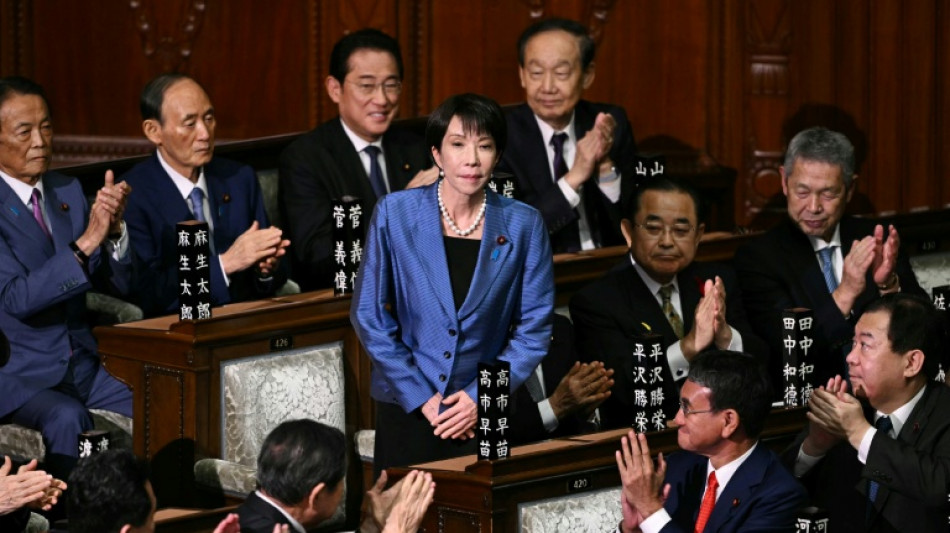
'Get married': The reality of Japanese politics for women

After Sanae Takaichi took office as Japan's first woman prime minister, AFP spoke to some of her younger counterparts who called it a symbolic victory.
The three local councillors anticipate Takaichi's win will do little to shift the male-dominated world of politics or entrenched expectations that women will prioritise family over career.
- 'Get married' -
After spending time away, Makoto Sasaki returned to her northern hometown Miyako, hoping to change local politics.
But as soon as she arrived, she was told by members of the public to focus on having a family.
"They said, 'You won't be able to get married if you work so hard'," Sasaki told AFP.
They also said I "wouldn't be a proper adult without giving birth", she recalled.
"It was shocking."
In Japan, gender roles are rigid, with women usually expected to look after the home and family, even if they work.
As a result, women are grossly underrepresented at all political levels, as well as in business and media.
Last year, Sasaki ran for election, aged 27, and became one of 22 local councillors.
"Unless we start cutting into these larger societal structures -- like the gender gap, the division of household chores by gender, or care work -- (the number of women politicians) won't increase," she told AFP.
Takaichi, whose hero is Margaret Thatcher, had promised to appoint a cabinet with "Nordic" levels of women, but on Tuesday, she appointed just two, the same number as her predecessor, Shigeru Ishiba.
"My region, Iwate, has never had a female political leader, whether for governor or mayor," Sasaki said, emphasising the magnitude of the problem in Japan, which ranked 118 out of 148 this year in the World Economic Forum's Global Gender Gap Report.
Men older than 70 make up about half of Sasaki's council in Miyako, and there are just three women.
- Juggling domestic labour -
In the coastal city of Toba, Chihiro Igarashi "worries constantly" about juggling her work as a councillor with caring for her two children, aged two and three.
"The belief that mothers are the ones who step in when children need them in an emergency remains deeply ingrained," said Igarashi, 37, stressing that her husband and in-laws fully support her.
For couples with children under six in Japan, women spend an average of seven hours and 28 minutes on housework, caregiving, childcare and shopping, while men spend 1 hour and 54 minutes, according to 2021 government data, the latest available.
Igarashi said she initially did not want Takaichi to be elected as prime minister because of her conservative policies, including opposition to same-sex marriage and support for a 19th-century law requiring married couples to share the same surname.
Takaichi also wants Japan's imperial family to stick to its male-only succession rules.
But equally, "her toughness is appealing... she must have made extraordinary efforts to reach the level," said Igarashi, one of two women councillors out of 13 in Toba.
"In my region, it's often civil servants, company executives or other locally well-known figures who become politicians," she said.
"And they're all men."
- Single mother stigma -
Erika Tsumori, a 34-year-old councillor in Atsugi city, near Tokyo, wants women to be given a chance to work without the constraints of societal expectations and stigma.
As a mother of two raising her children alone, she was told during her campaign that she should try to hide her family dynamics.
"My city is conservative, so I was told (during the election) not to openly reveal that I was a single mother," she said.
"I was also told I was not a proper candidate as I wore dangly earrings," she added, explaining that people saw them as too casual.
Tsumori believes Takaichi's win is a "symbolic victory" but that the situation is changing, with the number of women candidates growing.
In 2024, just over 23 percent of candidates who ran in the election for the powerful lower house were women, compared with nearly 18 percent in 2017 and 13 percent in 2005, according to official data.
Eventually, said Tsumori, "there will surely be more women politicians."
W.Phillips--TNT